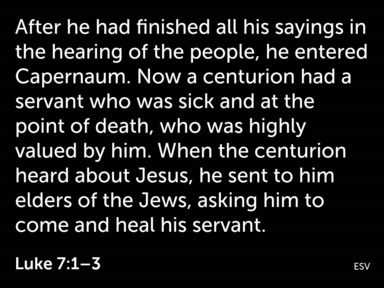13. The Saviour's Great Salvation (Luke 7:1-35)

Jesus Saves From Disease and Death, 1-17
Responding to the Saviour’s Salvation, 18-35
This centurion had a servant, and it is obvious that the centurion cared very deeply for his servant: his attitude to him is not one of patronizing contempt, but love. He was upset when he discovered that the servant was sick, even to the point of death.
But say the word, and let my servant be healed. 8 For I too am a man set under authority, with soldiers under me: and I say to one, ‘Go,’ and he goes; and to another, ‘Come,’ and he comes; and to my servant, ‘Do this,’ and he does it.”
9 When Jesus heard these things, he marveled at him, and turning to the crowd that followed him, said, “I tell you, not even in Israel have I found such faith.”
21 In that hour he healed many people of diseases and plagues and evil spirits, and on many who were blind he bestowed sight.